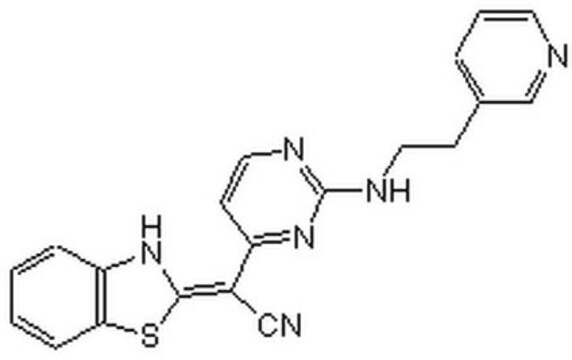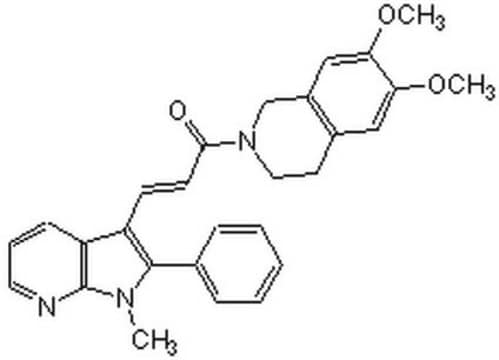124018
Akt Inhibitor VIII, Isozyme-Selective, Akti-1/2
Akt Inhibitor VIII, Isozyme-Selective, Akti-1/2, CAS 612847-09-3, is a cell-permeable, reversible inhibitor of Akt1/Akt2 (IC₅₀ = 58 nM, 210 nM, & 2.12 µM for Akt1, Akt2, and Akt3, respectively).
Synonyme(s) :
Akt Inhibitor VIII, Isozyme-Selective, Akti-1/2, 1,3-Dihydro-1-(1-((4-(6-phenyl-1H-imidazo[4,5-g]quinoxalin-7-yl)phenyl)methyl)-4-piperidinyl)-2H-benzimidazol-2-one, Akti-1/2
About This Item
Produits recommandés
Niveau de qualité
Pureté
≥95% (HPLC)
Forme
solid
Fabricant/nom de marque
Calbiochem®
Conditions de stockage
OK to freeze
protect from light
Couleur
yellow
Solubilité
DMSO: 5 mg/mL
Conditions d'expédition
ambient
Température de stockage
2-8°C
InChI
1S/C34H29N7O/c42-34-39-26-8-4-5-9-31(26)41(34)25-14-16-40(17-15-25)20-22-10-12-24(13-11-22)33-32(23-6-2-1-3-7-23)37-29-18-27-28(36-21-35-27)19-30(29)38-33/h1-13,18-19,21,25H,14-17,20H2,(H,35,36)(H,39,42)
Clé InChI
BIWGYFZAEWGBAL-UHFFFAOYSA-N
Description générale
Actions biochimiques/physiologiques
Akt1, Akt2, Akt3
Conditionnement
Avertissement
Reconstitution
Autres remarques
Logie, L., et al. 2007. Diabetes56, 228.
Barnett, S.F., et al. 2005. Biochem. J.385, 399.
DeFeo-Jones, D., et al. 2005. Mol. Cancer Ther.4, 271.
Zhao, Z., et al. 2005. Bioorg. Med. Chem. Lett.15, 905.
Lindsley, C.W., et al. 2005. Bioorg. Med. Chem. Lett.15, 761.
Informations légales
Code de la classe de stockage
11 - Combustible Solids
Classe de danger pour l'eau (WGK)
WGK 3
Point d'éclair (°F)
Not applicable
Point d'éclair (°C)
Not applicable
Certificats d'analyse (COA)
Recherchez un Certificats d'analyse (COA) en saisissant le numéro de lot du produit. Les numéros de lot figurent sur l'étiquette du produit après les mots "Lot" ou "Batch".
Déjà en possession de ce produit ?
Retrouvez la documentation relative aux produits que vous avez récemment achetés dans la Bibliothèque de documents.
Les clients ont également consulté
Notre équipe de scientifiques dispose d'une expérience dans tous les secteurs de la recherche, notamment en sciences de la vie, science des matériaux, synthèse chimique, chromatographie, analyse et dans de nombreux autres domaines..
Contacter notre Service technique














![PERK Inhibitor I, GSK2606414 GSK2606414 is a cell-permeable, highly potent inhibitor of EIF2AK3/PERK (IC₅₀ = 0.4 nM; [ATP] = 5 µM). Targets PERK in its inactive DFG conformation at the ATP-binding region.](/deepweb/assets/sigmaaldrich/product/structures/180/559/efa716dc-d5fe-4339-a6f0-0103084fc04a/640/efa716dc-d5fe-4339-a6f0-0103084fc04a.png)
